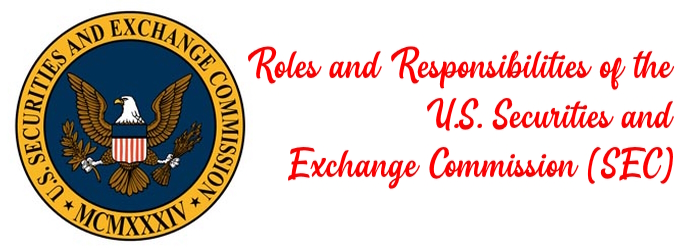Diving into the intricate world of the SEC, we uncover the crucial role it plays in safeguarding financial markets and protecting investors. As we delve deeper into its functions and impact on corporate governance, a clearer picture emerges of how the SEC navigates the ever-evolving landscape of securities regulation.
Exploring the nuances of SEC’s regulations and enforcement mechanisms, we shed light on the challenges faced by this regulatory body and the innovative solutions it employs to uphold market integrity.
Importance of the SEC
The Securities and Exchange Commission (SEC) plays a crucial role in regulating the financial markets, ensuring fair and transparent operations, and protecting investors from fraud and misconduct.
Role of the SEC in Financial Markets
The SEC oversees key participants in the securities industry, such as exchanges, brokers, investment advisors, and mutual funds. By establishing and enforcing rules and regulations, the SEC aims to maintain market integrity and promote investor confidence.
- Regulating Securities Offerings: The SEC reviews and approves registration statements for public offerings to ensure that investors have access to accurate and reliable information.
- Enforcing Securities Laws: The SEC investigates and takes enforcement actions against individuals or entities engaged in fraudulent activities, insider trading, or other violations of securities laws.
Importance of SEC for Investor Protection
Investor protection is a top priority for the SEC, as it works to safeguard the interests of individuals participating in the financial markets. Through regulatory oversight and enforcement efforts, the SEC aims to prevent market manipulation and ensure that investors receive fair treatment.
- Enhancing Transparency: The SEC requires companies to disclose relevant financial information and material events, enabling investors to make informed decisions.
- Providing Investor Education: The SEC offers resources and guidance to help investors understand their rights, risks, and responsibilities when investing in securities.
Examples of SEC Regulation in the Securities Industry
The SEC implements various regulations to maintain the integrity of the securities industry and protect investors from potential risks and abuses.
- Insider Trading: The SEC prohibits individuals from trading securities based on material non-public information, ensuring a level playing field for all investors.
- Market Manipulation: The SEC monitors trading activities to detect and prevent market manipulation tactics that could distort prices or deceive investors.
SEC’s Regulatory Functions
The Securities and Exchange Commission (SEC) plays a crucial role in regulating the securities industry to protect investors, maintain fair and efficient markets, and facilitate capital formation.
Primary Responsibilities of the SEC
- Registering and regulating securities exchanges, brokers, and dealers to ensure they comply with federal securities laws.
- Enforcing securities laws by investigating potential violations, imposing sanctions, and prosecuting offenders.
- Providing oversight of key market participants to promote transparency and prevent fraud.
Enforcement of Securities Laws
- The SEC enforces securities laws through investigations, inspections, and examinations to detect and deter misconduct in the securities industry.
- When violations are identified, the SEC can take enforcement actions such as imposing fines, disgorgement of ill-gotten gains, and barring individuals from working in the securities industry.
- By holding wrongdoers accountable, the SEC aims to protect investors and maintain the integrity of the financial markets.
Role in Maintaining Fair and Efficient Markets
- The SEC works to ensure that markets are fair by promoting transparency, preventing insider trading, and combating market manipulation.
- Through regulatory initiatives and enforcement actions, the SEC strives to create a level playing field for all market participants and enhance investor confidence.
- By fostering fair and efficient markets, the SEC contributes to the overall stability and integrity of the U.S. financial system.
SEC’s Impact on Corporate Governance
In the realm of corporate governance, the SEC plays a crucial role in shaping and monitoring the practices of companies to ensure transparency and accountability in their operations.
Influencing Corporate Governance Practices
The SEC influences corporate governance practices by setting regulations and guidelines that companies must adhere to. These regulations cover areas such as financial reporting, disclosure of material information, and the responsibilities of boards of directors. By enforcing these rules, the SEC helps maintain the integrity of corporate governance and protects the interests of shareholders.
Relationship with Corporate Transparency
The SEC regulations are closely tied to corporate transparency as they require companies to disclose relevant information to the public. This includes financial statements, executive compensation details, and any potential conflicts of interest. By promoting transparency, the SEC helps build trust between companies and their stakeholders, fostering a more open and accountable corporate environment.
Monitoring Corporate Disclosures
One of the key functions of the SEC is to monitor corporate disclosures to ensure that companies are providing accurate and timely information to investors and the public. This involves reviewing financial reports, proxy statements, and other filings to detect any inconsistencies or potential violations of securities laws. Through this monitoring process, the SEC helps maintain the integrity of the capital markets and protects investors from fraudulent or misleading practices.
Challenges Faced by the SEC

The Securities and Exchange Commission (SEC) faces several challenges in fulfilling its regulatory role. These challenges impact the effectiveness of the SEC in overseeing the financial markets and protecting investors.
Impact of Emerging Technologies
Emerging technologies such as blockchain, artificial intelligence, and high-frequency trading pose a significant challenge to the SEC’s regulatory efforts. These technologies have the potential to disrupt traditional market practices, making it difficult for the SEC to keep up with the pace of innovation. The SEC must adapt its regulations to address these technological advancements while also ensuring investor protection and market integrity.
Implications of Budget Constraints
Budget constraints can hinder the SEC’s ability to carry out its regulatory functions effectively. A limited budget may result in understaffing, lack of resources for technology upgrades, and difficulties in conducting thorough investigations. This can weaken the SEC’s enforcement actions and lead to gaps in oversight, potentially exposing investors to greater risks. It is crucial for the SEC to receive adequate funding to fulfill its mandate and maintain the integrity of the financial markets.
